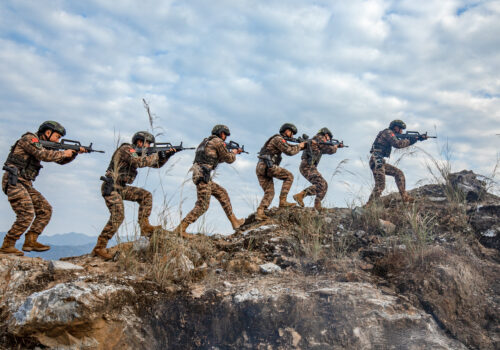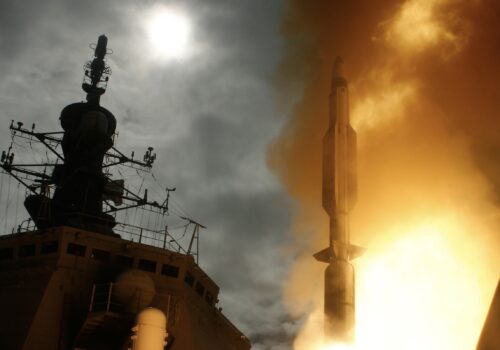To secure Taiwan, the United States must first secure Ukraine

Click on the banner above to explore the Tiger Project.
US defense priorities appear to be at a crossroads. Can the United States materially sustain Ukraine in its fight with Russia while preparing for a possible fight with China in defense of Taiwan? There appears to be a competition for resources between two seemingly distinct US foreign policy objectives. But if Russia defeats Ukraine and a future war between the United States and China occurs over Taiwan, the Russo-Ukrainian War will prove to be the first phase of this Sino-US War. The defense of Taiwan tomorrow is intrinsically linked to the defense of Ukraine today. If the United States hopes to secure Taiwan—either through deterrence or through victory in a future fight—the United States must first ensure that Ukraine maintains its sovereignty despite the Russian invasion.
Two threats, one dilemma
Ukraine is in an existential fight with Russia, resisting a murderous invasion through the resolve, courage, and endurance of the Ukrainian people. Ukrainian resistance is all the more impressive considering Russia’s significant advantages in resources and manpower, and the brutal disregard for human life that it transforms into tactical gains on the battlefield. Given this disparity in military advantage, sustaining Ukrainian resistance requires external support from a coalition of partners providing security assistance in the form of weapons, munitions, and materiel. The United States is, and remains, one of the key members of the coalition that supplies Ukraine.
At the same time, China continues its pressure campaign against Taiwan while increasing military preparedness for a cross-strait invasion. Whether China’s pressure campaign or a future military attack succeeds, the aim is the same: to destroy the sovereignty of a free and democratic Taiwan and subordinate it to communist China.
China is recognized as the premier threat to US national security interests, and the United States is committed to Taiwan’s defense. As such, US, allied, and partnered readiness for this contingency must be adequately resourced. This is essential to deterrence and, should deterrence fail, to fighting and winning.
Therein lies an apparent dilemma. Doesn’t the constant push of US military support to Ukraine drain the United States of critical resources needed to defend Taiwan? This supposed conflict led some commentators to speculate that supporting Ukraine undermines preparedness for a Taiwan fight.
Their case is simple, arguing that supporting Ukraine drains the finite US resources that should be husbanded and prioritized for deterring and fighting China. Every missile, tank, and artillery shell sent to Ukraine is one less round that could be fired in a China contingency. If preparing for a future war with China is the priority, they argue, the United States should deprioritize what they argue is a proxy war it is fighting against Russia.
The fates of Ukraine and Taiwan are entwined
But if this is so, why is Taiwan’s official position that the Russian invasion should be stopped? Why do its officials say the United States should maintain unwavering support to Ukraine, even at Taiwan’s expense? Joseph Wu, formerly the foreign minister of Taiwan under the Tsai Ing-Wen administration and now the secretary general of Taiwan’s National Security Council, argued compellingly that US aid to Ukraine is critical for deterring China, and that a Russian victory would embolden China to move against Taiwan.
While it is true that resources are finite, framing support to Ukraine or Taiwan as mutually exclusive is a false dilemma that is strategically unsound and unproductive to policymaking. More than that, it belies a lack of appreciation for strategic timing and sequencing, and for the connection between Russian aggression in Europe and Chinese aggression in the Pacific.
Ukraine isn’t preparing for a potential future war against Russia; it is fighting for its very survival against Russia right now. While Russia isn’t the premier threat to the United States, it remains an acute threat to US interests, one of which is a free Ukraine. With US support, Ukraine is bleeding Russia dry—in a financial bargain for the United States, with no cost of US lives, and without the political risk associated with the commitment of forces on the ground. Russian threats to interpret Western support as acts of war have proved to be mere saber rattling, as the United States has crossed each Russian red line with no significant consequence.
Russia’s inability to fight the war to a close has drained its military resources to such a degree that, despite its aspirations for great-power status, it must accept external support to continue its campaign. Much of this material and financial aid comes from China, indebting Vladimir Putin to Xi Jinping. A more shocking demonstration of Russia’s need for military support was its acceptance of North Korean troops into the theater of war.
Moreover, the protracted nature of the war continues to have deleterious effects on Russian national power. If this trend continues and Ukraine maintains its sovereignty at the war’s end, what was formerly an acute threat to US interests will be a mere shell of its former self. Russia, as a broken husk, will not reap the economic rewards of conquering Ukraine in its entirety and will be greatly hampered in terms of affecting US operations in a potential fight with China. In addition, US forces that might have needed to be husbanded to defend against Russian aggression and deployed to Europe to honor US treaty alliance commitments to NATO could instead reinforce military requirements for the Pacific in the defense of Taiwan. Finally, China will be further deterred from aggression in the face of sustained US resolve to support Ukraine. Despite the duration of the conflict, maintaining US support to Ukraine will be seen as a parallel for how stalwart US support would be to Taiwan if China threatened it.
The opposite is also true. Should US support to Ukraine fade and Russia emerge victorious, Russia will siphon economic power from the resources it takes from a conquered Ukraine, reconstitute its military power, and become emboldened toward greater aggression throughout Europe. China, too, will become emboldened by the faltering US resolve that led to Ukraine’s defeat, assured that the United States lacks the stomach to hold out against aims for which China is willing to fight. And in a future Taiwan contingency, Russia would be postured to support China in its time of need and reciprocate via material support, while also posing a significant threat to the rest of Europe. This would pin vital US forces and munitions to the European continent, where they will be of no assistance in a fight for the defense of Taiwan. Because of its strategic effects, the lost war against Russia will have proven to be the first phase in the eventual war against China. To defend Taiwan tomorrow, the United States must continue defending Ukraine today.
There is no zero-sum game between Ukraine and Taiwan
In addition, claims that US support to Ukraine prevents it from adequately supporting Taiwan’s defense overinflate the material cost to the United States and disregard the benefits to the industrial base surrounding US weapons production.
There is not a one-for-one tradeoff or a zero-sum game of munitions availability pitting Ukraine against Taiwan. Many of the systems optimal for use in the defense of Ukraine are not suited for a Taiwan defense scenario, and vice versa. US aid provided to Ukraine since the Russian invasion is suited to fighting a continental land war characterized by mass and attrition, incorporating modern technologies. Specifically, this has consisted largely of artillery and mortar rounds, tanks, infantry fighting vehicles, armored personnel carriers, anti-armor systems, and short-range unmanned aerial systems. All of these would be ill-suited for the air, maritime, and littoral fighting that would dominate a Taiwan scenario. There is little direct competition between these systems and those optimized to defend Taiwan and fight China, which also characterizes the bulk of foreign military sales to Taiwan, which include sales of hundreds of Harpoons, Patriot assistance, Sidewinder missiles, and Switchblade loitering munitions, among others.
Finally, the provision of US arms to Ukraine has served as a test run for the US military industrial base, revealing challenges, stovepipes, and other hurdles to meeting timely production goals. This postured the United States to course correct, yielding congressional action to accelerate support to Taiwan, including the Taiwan Enhanced Resilience Act, which authorized Foreign Military Financing to Taiwan for the first time and amended Presidential Drawdown Authority to provision Taiwan directly with US Department of Defense stocks and services. As US support for Ukraine’s defense continues to stress test it, the US industrial base will only grow more capable and resilient, and will be better prepared to accelerate production for the defense of Taiwan. Rather than a zero-sum game, investing in Ukraine’s defense now creates more opportunity for Taiwan tomorrow.
To win in Taiwan tomorrow, the United States must win in Ukraine today
Under today’s conditions, the United States is supporting, by proxy, a single-front war against a decaying Russia. If this future holds and Russia fails to meet its wartime objectives, the United States can later focus the preponderance of its strength against China to deter its aggression against Taiwan and, if necessary, posture to win.
But deprioritizing Ukraine will lead to its defeat and set conditions for the United States to face a future two-front war against an emboldened China and a reconstituted Russia. This is a matter of strategic sequencing of the existential needs of the moment and how they will impact the existential needs of the future. If the United States is firmly committed to the defense of Taiwan against a future Chinese invasion, it should focus on defeating Russia in Ukraine today.
Lieutenant Colonel Brian Kerg is an active-duty US Marine Corps operational planner and a nonresident fellow in the Indo-Pacific Security Initiative at the Atlantic Council’s Scowcroft Center for Strategy and Security. He is also a 2025 nonresident fellow with the Irregular Warfare Initiative, a 501(c)3 partnered with Princeton’s Empirical Studies of Conflict Project and the Modern War Institute at West Point.
The views expressed here are those of the author and do not represent the positions or opinions of the US Marine Corps, the Department of Defense, or any part of the US government.
The Tiger Project, an Atlantic Council effort, develops new insights and actionable recommendations for the United States, as well as its allies and partners, to deter and counter aggression in the Indo-Pacific. Explore our collection of work, including expert commentary, multimedia content, and in-depth analysis, on strategic defense and deterrence issues in the region.
Related content
Image: Ukraine solidarity protest Taipei, Taiwan March 13th, 2022. Wikimedia commons


